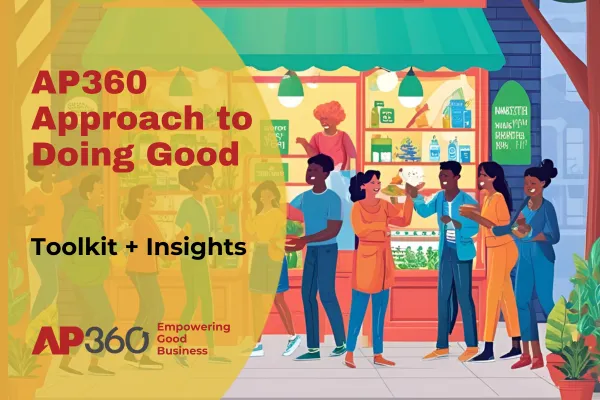
Unlocking the Potential of Business for Good
AP360 Approach to Doing Good
Doing business for good isn’t about occasional acts of charity or chasing trends. It’s about embedding values into every touchpoint — from your brand voice to your backend systems. We call this a 360-degree approach to doing good — because your impact should ripple through every part of your business.
Small businesses can lead the way
You don’t have to be a big name or have a massive budget to make a difference. In fact, small businesses are often more agile, closer to their communities, and more in touch with the real-life needs of their customers. You’re in the perfect position to lead by example.
Whether you're just starting out or have been running your business for years, the shift toward doing good doesn’t require a full rebrand. It can start with one conscious decision — and grow from there.
What does a 360-degree approach look like?
Here’s how to build a purpose-driven business from the inside out — without overcomplicating things or blowing your budget.
🔧 Free Toolkit: 360° Business for Good Checklist
Use this toolkit to review and strengthen your values across every area of your business.
1. Brand & Marketing
☐ Is our brand story clear, human, and values-driven?
☐ Are we being honest and transparent in our messaging?
☐ Are we avoiding greenwashing and buzzwords that don’t mean anything?
☐ Do our marketing channels reflect our purpose (socials, website, packaging)?
Bonus Tip: Use ethical marketing strategies — focus on impact, not fear or FOMO. Authenticity goes a long way with Gen Z and Millennial customers.
2. Customer Experience
☐ Are we making it easy for customers to find out how we’re doing good?
☐ Do we provide accessible, inclusive experiences online and in-store?
☐ Are we educating our customers on how to support ethical practices?
Bonus Tip: Add an Impact or Our Values section to your website. It builds trust and helps with SEO by including terms like “ethical small business” and “sustainable operations.”
3. Operations & Supply Chain
☐ Are we choosing local, ethical or circular suppliers where possible?
☐ Are we actively reducing waste, energy use, or unnecessary packaging?
☐ Do we have systems in place to monitor the efficiency of our operations?
Bonus Tip: Even switching to digital invoices, second-hand office gear or eco printers counts — and it’s worth telling your customers about these choices.
4. People & Culture
☐ Do our policies support flexible work and fair pay?
☐ Are we fostering inclusion — across gender, ability, culture and background?
☐ Do our contractors, VAs or casuals feel valued and informed?
Bonus Tip: Gen Z and Millennial customers care how you treat people behind the scenes. If you’re fair and transparent, make it part of your story.
5. Community & Partnerships
☐ Are we supporting local initiatives or community causes?
☐ Are there industry collaborations that align with our values?
☐ Can we donate time, skills or goods instead of just dollars?
Bonus Tip: Partnering with community organisations or like-minded small businesses can grow your audience and your credibility — no ads required.
What next? Make it visible, make it consistent
Once you’ve reviewed your 360-degree business impact, tell people about it! Customers want to know what you stand for, but they won’t always go digging to find out. Add your values to your marketing content, create regular updates, or even start a blog series about your sustainability journey.
Remember: you don’t have to do everything. Start with what’s doable, document your progress, and keep it real. This approach not only builds trust — it also boosts your SEO, strengthens your brand, and attracts loyal, socially conscious customers.
Download the full 360° Business for Good Toolkit
Want the checklist in a printable format with extra tips?

